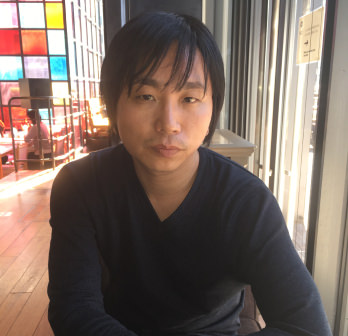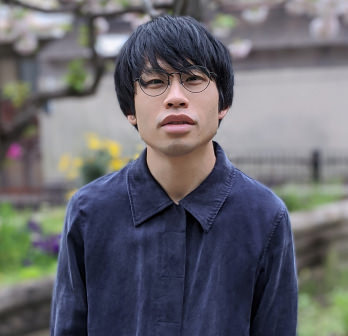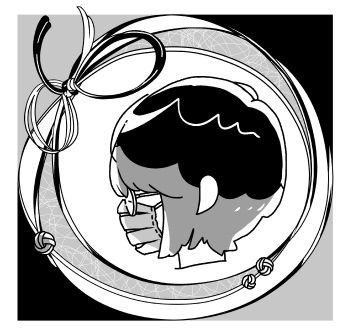*
“Going somewhere? That’s a lot of stuff,” Dad commented, a glass of milk in his hand post-bath, and I looked around, self-conscious.
He was eyeing all the things I was thinking about taking with me tomorrow. On the day before the trip they had multiplied; they reflected my indecision.
Ayuha had named a Saturday for our field trip. It was the day before the first anniversary of my mother’s death, so I had wavered over whether to go, but staying in the house probably wasn’t a great idea either, so in the end I’d decided to go. It wasn’t like I was going for fun. But I couldn’t decide what to bring, as everything I’d usually bring on a school field trip seemed oddly uptight, too formal.
Getting more and more tired of thinking about it, I was packing most of the things I’d laid out into my tote bag.
Dad picked up one of them. “You’re taking this with you?”
It was the Ainu cookbook I had borrowed the other day. A few minutes ago it had helped me have dinner.
“You got this book out?” he asked.
“Mmhm.”
“You got it out yourself, Chiyuki?”
“Mmhm.”
I don’t usually get books out from the library; maybe that was why Dad looked at the cover, then back at me again, with a surprised and strangely moved expression, and then chuckled. Afraid he might probe further, I retrieved the book from his hand quick smart.
“Like mother, like daughter,” he murmured.
“Huh? What?”
“Nothing. I meant to say, if you’re going to take such heavy things, you need a backpack, not a tote. Get a backpack, take a backpack instead.”
“Oh. But isn’t a backpack too uptight?” I wondered out loud.
“What do you mean, uptight?”
“...Ah, never mind.” I suddenly got embarrassed and squeezed my lips together.
Dad was unfazed. “Take care,” he said with a smile, and patted me on the head.
*
“Hey, let me do the introductions,” Ayuha said. “This is my grandma. Gran, this is Chiyuki.”
“Nice to meet you, I’m Chiyuki Kaya.” I trailed off awkwardly.
“Yes, hello. I’m Grandma Yaeko.” Following Ayuha’s lead, Yaeko bobbed her head in a small bow, all smiles.
“You said this was a field trip?” I lowered my voice, casting a sidelong glance at Ayuha.
She was unapologetically nonchalant. “Hands-on study is best, you know? Our Ainu roots are matrilineal. By the way, we’re going to stay the night.”
“What!” I could almost see the heart emoji at the end of her sentence, as she smiled, totally carefree, and inwardly I buried my head in my hands.
The last thing I’d expect on a “field trip” was to be taken to a private space like her grandma’s house. When I messaged my dad to check whether I could stay overnight, as we hadn’t discussed it, I was even more flustered when he readily gave his stamp of approval, saying “The memorial service isn’t until the afternoon, so have fun.”
Ayuha went to get some bedding, leaving me stranded in the living room. My gaze wandered around until my eyes met Yaeko’s. Faced with her warm smile, as I was racking my brain for topics of conversation, my dream came to mind.
“So.” I took the Ainu cookbook out of my backpack and showed it to her. “Have you—have you ever heard of a proper meal like this one being given to an animal?”
She tilted her head slightly as she looked down at the book in my hand. “To an animal?”
“Yes. You know, like a bear or something ...” I said, looking anywhere but at Yaeko, and she nodded, mhm.
“In the old days, there were bear cubs raised that way, so I hear. They were given the best portion of the meal, before everyone else, and when they were really young they were even breastfed.”
Then Yaeko showed me some books. On a page about the ritual of Iomante, there was a description which echoed what Yaeko had said, and a picture of a cage like the one I always found myself in in the dreams.
“Getting friendly already?” Ayuha had come back at some point, and was looking over my shoulder.
“Yes, we are. I’m so happy you girls came to visit me: I’m having fun today for the first time in ages.” Yaeko’s gentle smile reminded me of my mum all of a sudden. My chest felt squeezed, but warm, and the pain didn’t well up.
“Um, thank you for having me. I’m grateful.” I sat up straight again and turned to them, bowing my head deeply.
My big backpack was useless, as I hadn’t come prepared to stay the night, so I went out to buy the things I needed. It was a fifteen-minute walk to the nearest convenience store; Ayuha came along too, saying she was going to buy some snacks.
As a quick fix I got an overnight kit, and we walked back in single file down the narrow sidewalk.
“You surprised me a bit, just now,” Ayuha said as she walked in front, keeping her eyes on the road ahead. “Chiyuki, you have this kinda hard-core knowledge.”
For a moment I didn’t get what she was talking about, but then it clicked that she meant how I'd been talking to Yaeko about the Iomante ritual. “No, not at all, that’s not what that was...”
“Really? But you’re doing better than I am, though. I really don’t know anything about my Ainu heritage.” Although her tone of voice was still bright, there was a kind of bleakness in her words. I couldn’t see her face, as her back was to me as we walked along.
“What about Yaeko?” I asked.
“I’m close with my gran, but we stay away from that, you might say. Not like on purpose, but just naturally. And I didn’t use to care.”
I was a little shocked but didn’t say anything. She’d brought me here in such a natural way, calling it a field trip; I’d taken it for granted that for her it was just the usual.
“My mum’s not into it at all. Anyway, that’s fine for her. That’s pretty normal, isn’t it?” Ayuha paused. “But it’s different for me. I feel like it’s about who I am, more and more. But that’s why–” She broke off, but soon continued in slow clouds of frozen breath. “I don’t know the first thing about it.”
Ayuha kicked at the slushy snow underfoot, the toe of her shoe skimming the sidewalk. Her downcast hair was swept up by the gentle breeze, and melted into the orange of the sunset. As she leant forward in profile, she was smiling, but I’d seen her insecurity.
“It’s like, how can I be such an empty vessel?” Ayuha continued. “I mean, that’s the kind of thing I think. All I have is the ancestry, you know?” She kept walking, springing forward in long strides—one, two, three—and then wheeled around to face me. “In fact, the day I told you I was Ainu was the first time I’d ever said it out loud.” She was already back to normal, grinning like she was clowning around.
I felt I should say something, but I didn’t know what; I was walking up behind Ayuha as if pulled along. But before I could catch up with her, for some reason she ran away shrieking, and even though I’d had no intention of doing so, perversely I chased after her again. And so, like two little kids, I kept chasing her and she kept running away, eventually all the way home.
As soon as we set foot in the living room, Ayuha crashed out on the tatami floor in a state of total exhaustion, saying only: “That’s my limit”. She began to breathe evenly in her sleep, so first of all I drew a blanket over her shoulders.
Yaeko was standing in the kitchen, her back to me. A large pot was on the stove. When I casually glanced over at her, she felt my look, and turned around with a smile of welcome.
“This is called ohaw,” Yaeko explained, indicating the pot. “When I was a child, my grandmother lived with us and she made it every day, so there was always ohaw on our table.”
“So that’s why you do the same?” I asked.
Yaeko laughed. “That’s why I didn’t use to make it at all. But it’s strange, you know. At this age, I started to really feel like it. Now I’ve got in the habit of having it every day.” With a fond, shy smile, Yaeko lifted the lid of the pot. Soft steam puffed out and a wonderful aroma tantalized my nostrils.
In the pot, daikons cut into thick half-moons, carrots, and large potatoes cut in halves jostled each other. The pale golden soup, like melted amber, was beautifully glassy, and the salmon peeking out between the chunks of root vegetables had not lost its vividness. Each vegetable retained its original colour, but the colours were so pale and tender you could tell they had absorbed the soup to their cores. It was the soup that had always appeared in my dreams.
Smiling, Yaeko asked, “Want to try some?”
I nodded. “Yes please.”
I felt pretty good, maybe from the random exercise I’d just done. The timing was questionable, but I could probably get away with counting it as one of my three meals.
Piled high in the bowl, the ohaw was so luscious that even when I brought my face close to it I didn’t get the feeling of my body rejecting it. Accompanied by Ayuha’s deep, regular breaths, I made short work of the generous serving of ohaw, without needing to open the book I had ready just in case.
Before long Ayuha woke up, and another heaping bowl of ohaw was placed on the table. Ayuha hesitated for an instant over the big chunks of vegetable in the bowl, like she was fussy about what she ate, but ended up draining the soup to the last drop. Yaeko didn’t comment, but she looked secretly delighted.
“Ayu, ’Yuki.” After dinner and cleanup, Yaeko beckoned to us as we lazed in the living room.
In her hand was a book. “Since you two came here especially,” she said. “Actually it would be great if we could forage for wild plants, but it’s still too early in the year for that, isn’t it? So, just a little of this for now.” She smiled warmly at us; we sat down beside her, and still beaming, she dropped her eyes to the open book.
Yaeko let a beat of silence pass. “I was a girl who lived with my father and mother.” Her voice had become measured and deliberate, as if gathering up words that had dissolved into the air.
One day, the girl was working in the fields as usual.
She heard tell that the wife of the chief of the village downstream had died of a serious illness, and so she wanted to visit to offer her condolences. But the poverty-stricken girl had no offering and no suitable clothes to wear. She had given up and was working in the fields, when the god who dwelled in the bush clover leaves whispered to her that she should take the pukusa from her house—the wild onion—and go at once to the house of the chief.
When the girl arrived at the chief’s house, this time the pot god spoke to her, telling her that the chief’s wife had set about uprooting all the pukusa plants and had incurred the wrath of the pukusa god. But if the girl did as the pot god said, she might be able to save her life.
“I ran to the southern slope the pot god had told me about, and while scattering the pukusa I had brought with me all around, I cried out, “As I return the spirit of the pukusa god, please spare her life.”
Yaeko broke off, letting the moment linger unresolved, and closed the book. Instantly, the expanding bubble of story burst, as if it had been popped with a pin.
“And then...?” I ventured, to encourage her to keep going.
That was what Yaeko had been waiting for; the corners of her mouth turned up in satisfaction. “To be continued, next time.”
“What?” we both demanded.
Yaeko laughed with joy at our reaction. “So come back again, both of you. And in May, we’ll be able to forage for wild plants, won’t we?” she emphasized.
We looked at each other, mouths still half open. After a beat, both of us burst out laughing and nodded.





